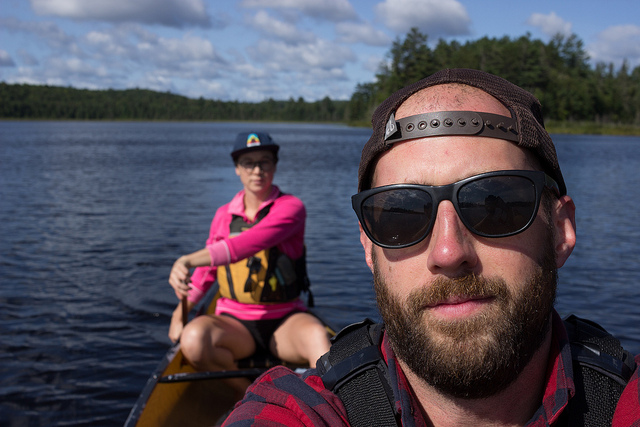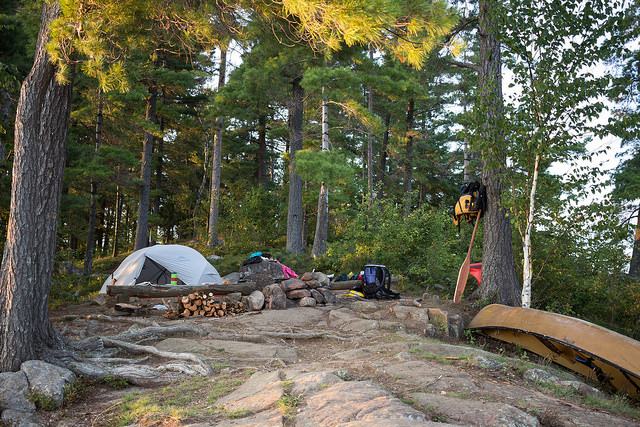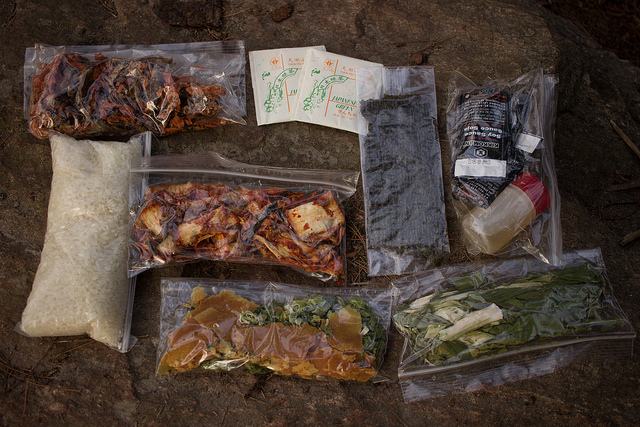While some of us are gearing up for Back to School, others, like my buddy Cory, are taking in the last breaths of summer in the wilds of Algonquin Park.
Cory and I first met working at a cafe, him slinging lattes and me cooking & baking. I couldn't believe how easy he made portaging solo sound and I wanted to know more. I soon found out how innovative he was with using his food dehydrator to make many days worth of gourmet food. Well, gourmet for camping's standards!
Here is my Q&A with him.
(and speaking of back to school.. according to Cory this is "the closest thing I've had to homework in a long time!")
Who are you?
Cory Conty: an avid canoe camper and lover of food.
Why do you love camping?
The time you spend camping is reduced to just the essential, important things in life: staying safe, having a place to sleep, cooking your food, and appreciating the people around you. It's also a good way to test and appreciate your physical fitness and problem solving skills. It reminds you that you can be an active participant of nature and not just a removed observer of it.
How many meals and for how many people was this for?
Five meals for two people: 3 dinners and 2 breakfasts.
Approximately how long did this take you to prepare ahead of time?
Prep time for each meal is not really much more than if you were cooking it at home, i.e., chopping, cleaning, portioning. The dehydration depends on the food item, but can range from 7-12 hours for each meal. The only extra time involved is packaging. As time consuming as it is, it is very important in order to make sure the serving sizes are correct and the mess in the backcountry is kept to a minimum. But it generally takes a day (including dehydrating) for each day your trip is. If I'm going for a week, I start a week in advance prepping the food. But it's only about a half hour of actual work each day, the rest is just waiting for the dehydrator to work its magic.
How long did it then take you to cook all the meals once you arrived?
Depending on whether you are using a camp stove or camp fire, it can take anywhere from minutes (enough time boil water and fry scrambled eggs) to several hours. Cooking a pizza on a campfire with a reflector oven definitely has to be a labour of love. Including proofing, preheating, and cooking, it takes about two hours. But a typical meal generally takes about 30-45 minutes.
Did you buy anything pre-made that didn't require dehydration?
I try to make everything from scratch, but certain things are very time consuming. The apple/fruit sauce started as a store-bought sauce, as well as the butter chicken and spaghetti sauces.
If time is available, I would always recommend making things from scratch. It always tastes so much better than store bought. When you're out in the woods and it's cold and rainy and you're exhausted, having a taste of home is invaluable.
What gear / equipment did you need to cook or prepare everything? Did you bring your own water?
The only special equipment that I use other than a campfire and/or camp stove is a food dehydrator. There are many different models available at various price points. It's even possible to dehydrate in your oven, it's just harder to achieve consistent results. As for water, when you're in the backcountry there is no way to pack, paddle, and portage all the water you will need. A pump style water filter is a must. I use the MSR Miniworks, and it's served me well for the past ten years.
Did it actually taste good?
Everything tastes surprisingly good. Other than a slight difference in the texture of certain food items, the taste is exactly what you'd expect at home. I try to avoid all overly salty seasonings since most dried foods in the grocery store and backpacking specific meals in outdoors stores all rely heavily on salt and artificial flavourings for taste.
How well did it keep you fed? It looks as though you were pretty active on your trip!
Rather than eat and cook "traditional" camping food, I try to emulate what I would eat at home while canoe tripping. That way I know both my nutritional requirements as well as my tastebud's needs will be met: eggs, fruit, and coffee in the morning; protein and veggies for dinner. Fruits and vegetables are a big one for me. Usually after a week or so paddling and portaging your body is crying out for "real food". Having rehydrated fruit sauce and berries each morning and at least one rehydrated veggie (sometimes a salad) in the evening really keeps you feeling great on long trips. However, lunch is another matter altogether.
What make and model of dehydrator do you use?
I use the cheapest one I could find: the Salton Vita Pro (~$50). They can range as high as the $250 mark.
How did you come up with your creations?
I've definitely picked up some tips online about packing and preparing camping food, but I've really found success by "reverse engineering" meals and foods that I eat everyday. I think of a meal that I love and I visualize how I could take all the water out and make it shelf (or barrel) stable. Sometimes you have to make substitutions, but that's when you can get creative. Another good tip is to try to come up with sauces and dressings made with condiment packets: ketchup, mustard, vinegar, mayo, sugar, honey, soy sauce. They are easy to pack, very versatile, and already portioned. And if you get a little creative they can be procured for free (thanks for the honey packets, Starbucks).
What was the most interesting discovery you found in your dehydrating journey?
You can dehydrate salad!!! I've made both coleslaw and kale caesar salad with great success. Also, eggs are amazingly simple to dehydrate and cook up (almost) identical to fresh, and the weight-saving is significant.
Can you recommend any books or blogs for people wanting to earn more about dehydrating whole meals?
[T]here are a lot of YouTube videos about food dehydration. But don't limit your searches to camping food, lots of people dehydrate for many different reasons: harvest preservation, "prepping", raw food diets, etc. And remember, food dehydration is probably the most ancient form of human food preservation. There is a wealth of knowledge out there on the subject.
Why did you embark on this dehydration quest?
It can be very time consuming from the outset, but on a recent canoe trip my girlfriend and I covered 150km including about 20km of portages and the virtue of dehydrated food's pack ability and lightweight was apparent immediately, especially on the first day when the food barrel was the heaviest. And on the last day the hydrated veggies, eggs, and fruit were just as satisfying as if we had made them at home.
Cory's Dehydration Prep Tips
- Rather than dehydrating a big batch of one particular food item (dehydrating several pounds of ground beef and adding it to individual meals), I like [to] prepare a single meal, dehydrate as a meal, and package as a meal. It's a bit more time-consuming, but that organization cuts down on waste and simplifies preparation.
- Most dehydrators have several trays, so you can put each item on its own tray. If you want flavours of different ingredients to mingle and get to know each other, precook them together and dehydrate them as a group. That will save a lot of cooking time in the backcountry, (i.e., ground beef or meat balls cooked into pasta sauce rather than dehydrated separately and added together at camp).
Cory's Dehydrated Coleslaw Recipe
It's a great way to have crisp, crunchy vegetables while camping.
Ingredients
- shredded cabbage and shredded or matchstick carrots.
- packets of mayo, vinegar, mustard, sugar, and salt & pepper.
Dehydrate cabbage & carrots at 135 degrees until they feel like dried autumn leaves (Don't worry, it will be a lot more appetizing than that sounds).
To hydrate, pour boiling water over veggies and let sit for about 10-15 minutes. Drain them and pour over cold water to cool them down. Drain out cold water and add condiment packages to taste.
---
Thanks for being my first guest post subject, Cory! Follow him on Flickr.
Comment below with some of your foodie camping tips















